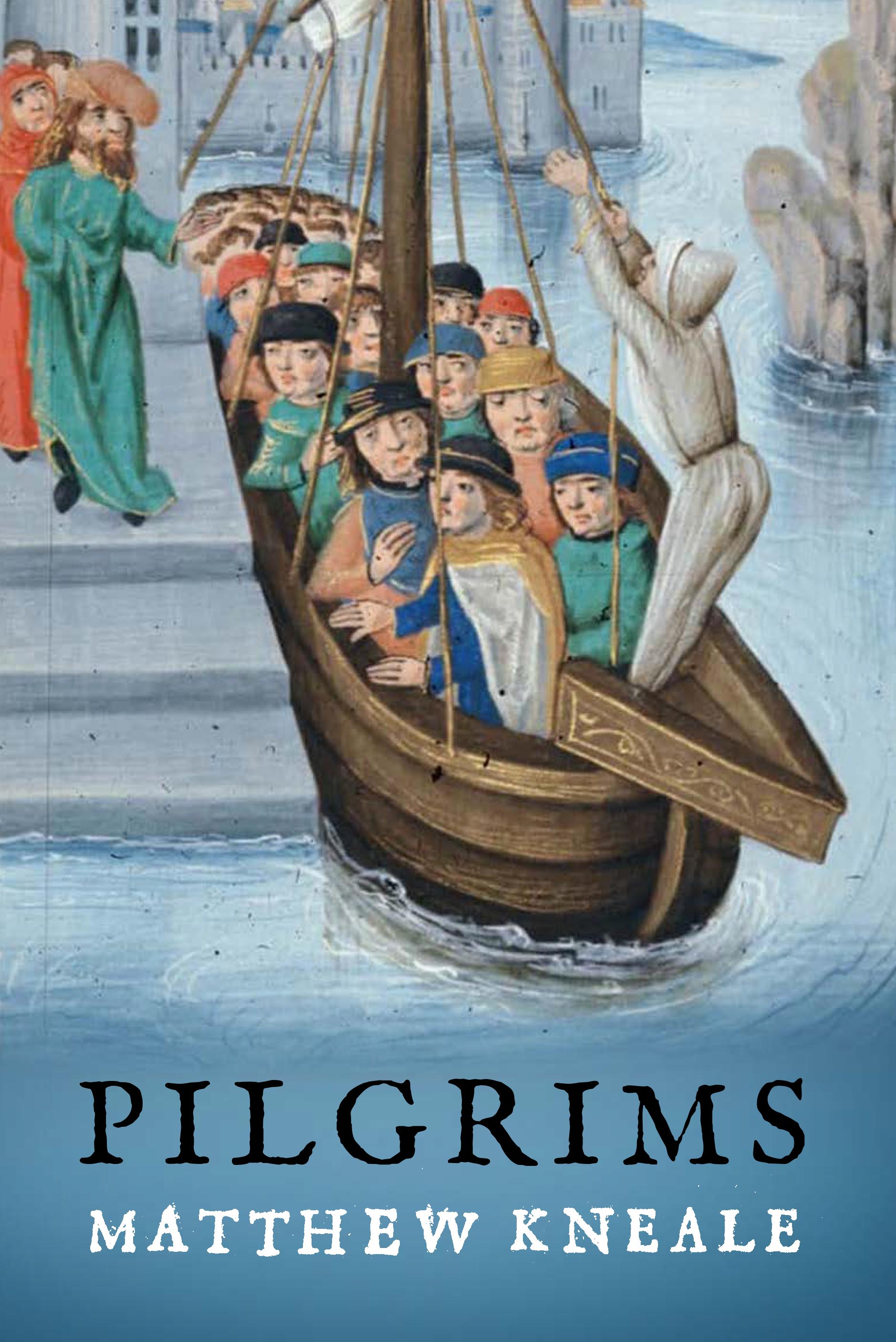 |
.... |
Reviews
of "Pilgrims" |
Matthew
Kneale. Counterpoint, $26 (272p) ISBN 978-1-61902-235-5
'Matthew Kneale's new novel could hardly be a more welcome getaway from our present world of lockdown and social distancing... a novel that brims with comedy... for all his book's euphoria, Kneale never ignores an evil that pervades its period. Humane outrage pulses through this novel along with comic ebullience.' - Peter Kemp, Sunday Times
'There's a sly, humane comedy in the way Kneale ventriloquises both the stranglehold of religious law on daily life and thought and the endlessly inventive individual efforts to exploit and interpret it... Linguistically, Kneale treads lightly, with a chatty, modernised version of medieval English that slips down easily... by the book's ending, the broad comedy and easy cohesion of the central characters - a Merrie England in miniature - are revealed as artful choices. Their pilgrimage is bookended by persecution, a structural counterpoint that casts the main narrative in shadow and exposes the seam of prejudice running through our national story.' - Justine Jordan, Guardian
'So delighted... A source of constant delight... A wonderful novel' - Tom Holland, Front Row, BBC Radio 4
'If you didn't already know that Kneale is a historian as well as a novelist, it wouldn't be hard to guess from this rich and absorbing book.' - James Walton, The Times
'Kneale's novel takes readers back to an age of religious superstition with such assurance that every word rings true.' - Max Davidson, Mail on Sunday
'... uproariously funny scenes... Kneale pulls no punches when satirising the corruption of the church, which raked in money by promising paradise, as St Peter was believed to hold the keys to Heaven... Just as English Passengers shone a light on the racism of colonialism, Pilgrims highlights religious persecution. For all of the hilarity of the pilgrims' capers, Kneale does a good job of showing us the darker side of British history - and reminding us that in silence lies complicity.' - Mia Levitin, Financial Times
'Kneale's medieval world is animated by a refreshing lightness of touch.' - Simon Heffer, Sunday Telegraph
'... a warm-hearted tale, full of intriguing historical detail, plot twists and comedic light touches.' - Robbie Millen, The Times
'The novel's rich polyphony builds into a panoramic picture of late 13th-century England, divided by status but supposedly united in faith. Yet a murderous anti-Semitism simmers, and this motif returns to bend the story's arc.' - Boyd Tonkin, Independent
'...a broadly humorous unpacking of medieval society and belief, with a dark seam of hatred - of the recently conquered Welsh, and particularly of England's tiny but reviled Jewish population - coursing through it.... an enjoyable exploration of ancient English beliefs and loyalties that still have disquieting echoes today.' - Nick Curtis, Evening Standard
____________________________________________________________________________
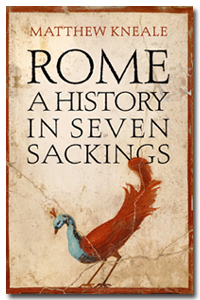 |
.... |
Quotes
from "Rome A History in Seven Sackings" |
'Kneale has found an elegant path through the labyrinth [of Roman history]... Utterly compelling, brilliant indeed.... Wonderfully moving and inspiring. ' Allan Massie, Literary Review
'Each chapter ends with a thrilling narrative of the fall of Rome... Enough to make you wonder why more novelists don't try their hand at history writing... Kneale's account is a masterpiece of pacing and suspense. Characters from the city's history spring to life in his hands... This is a big, gaudy, ebullient book... Kneale has done his adoptive cities proud, all seven of them' Peter Thonemann, Sunday Times
'With loving care. Kneale records everything from the city's food (16th-century Romans were already feasting on buffalo mozzarella, pappardelle and truffles); its time system (the "day" began with an ave Maria at sunset) ; to its more arcane wooing methods (an ox was essential) and the taste of its water (bilge)... As the centuries and the chapters pass you see, as if in literary time-lapse, the outline of Rome expand and contract like lungs - from 25,000 in 380 BC to the puffed-up classical glory of a million souls, then on to the deflating centuries that followed when its population lived in the shadow of the glory that was Rome.... A delight.' Catherine Nixey, the Times
'..ingenious and wholly enjoyable...' 'Kneale is best known as a writer of historical fiction... and he comes to history with a storytellers's eye.' ...though he wears it lightly, he is clearly a meticulous researcher. It is a mark of Rome: A History in Seven Sackings' quality that I wanted to take it with me to the city and trace, book in hand, the marks {the city's invaders} had left... Superb.' Tim Smith-Laing, Daily Telegraph
'A stirring portrait of a city at war... The historian and novelist's episodic account of a resilient population brings Rome's fractious past to life.' Christian House, Observer
'A popular, accessible history of Rome that is not a guide book in disguise should be welcomed. Matthew Kneale's account, deftly written and using a wide range of up-to-date as well as ancient sources, provides just the answer an interested reader might seek. He covers the history, if not quite from the foundation of the city, then from the fourth century BCE up to the "sprawling metropolis" of today.' Timothy Connor, The Tablet
'Masterfully told... This conversational and approachable style makes for an easy read. Kneale obviously knows his subject well but wears his knowledge lightly and entertainingly.' Mark Beech, Dante Magazine
'This magnificent love letter to Rome comes in the form of a vivid chronicle of the great city's repeated catastrophes and recoveries. Sharp-eyed, richly informed, tirelessly curious, and often wryly amusing, Kneale is the perfect Virgil to accompany any pilgrim who wishes to trace the vast spiral that leads from the ancient past to the bittersweet present.' Stephen Greenblatt, John Cogan University Professor of the Humanities, Harvard University
"ROME: A HISTORY IN SEVEN SACKINGS is that rarest of treats: an erudite history that reads like a page-turner. With a novelist's eye for the revealing detail, and the genial grace of your favorite tour guide, Matthew Kneale plunges us into the fascinating palimpsest they call the Eternal City. Magnificently entertaining all-around!" Maria Semple, author of 'Where 'dyou go Bernadette' and 'Today will be different'.
Rome is almost certainly the most written-about city in human history, and (Kneale) is working 2,500 years of action. The brilliance of his own raid on Rome lies in the principle of selectivity he has brought to it - what is done to Rome matters as much as what Rome does to the world - and the depth of his research (his information notes cover 18 pages)... He quotes an American nun describing the arrival of a jeep with four American soldiers in it: "The thing looked so solitary, yet so significant in the cool stillness of dawn. I had it all to myself for a few seconds." This kind sensitivity to language is unusual in a book intended for a popular audience. Whether they are drawn from legendary ancient historians or unsung modern eyewitnesses, moments like this one are what put Kneale one step ahead of most Roman chroniclers. Aaron Retica, New York Times Book Review, July 2018
Now and then he interrupts the narrative with a time traveler's sidelong view or whisks us away to some distant place touched by the successive tragedies of Rome... Most of Mr. Kneale's story, however, is staged within the walls of the city he evokes with casual brilliance.... Mr. Kneale's achievement is to remind us of the past upheavals that lie only a few inches beneath the cobbled streets of the eternal city. Greg Woolf, Wall Street Journal, June 29 2018
A richly textured chronicle, teasing meaning out of intense turbulence. Bryce Christensen, Booklist (starred review) 01.04.2018
A lively perspective on Rome's rich history. Kirkus Review March 5 2018
____________________________________________________________________________
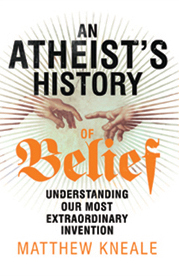 |
.... |
Reviews
of "An Atheist's History of Belief" |
Publishers
Weekly reviews
Matthew
Kneale. Counterpoint, $26 (272p) ISBN 978-1-61902-235-5
Yet
another atheism title attempts to make the reader
“forget Dawkins or Hitchens,” as this
book’s publisher suggests, and render skepticism
understandable. And British writer Kneale accomplishes
just that in his lively look at the history of religious
belief, from ancient humanity to the 20th century.
The author succeeds not because he formulates sharper
theories or ideas about non-belief, but because
he barely mentions non-belief at all. Where other
authors, like those apostles of atheism, Dawkins
and Hitchens, have become bestsellers by condemning
religion and haranguing its followers, Kneale takes
a more gentle, reasoned approach. He views religion
as the invention of cultures seeking to assuage
their various fears and insecurities. That’s
not a new tack— scholars have long studied
religion in the context of its inventors’
needs and aspirations. But Kneale, a novelist whose
English Passengers (2000) was shortlisted for the
Man Booker Prize, brings to this angle a storyteller’s,
rather than an academic’s, touch. It’s
a pleasant read, just not a very hardline atheistic
one. Agent: Deborah Rogers, Rogers, Coleridge &
White Literary Agency. (Feb.)
______________
Susmita
Chatto
- The Book Bag - Link
to the Book Bag review
I’ve
been an atheist since I was old enough to take a
view on the subject. (Many atheists would argue
that we’re all atheists at birth, but that’s
not a subject for a book review). I did have to
take Religious Studies at school but have entirely
forgotten almost everything I learned!
The result is that most cultural references involving
religion are lost on me. Between that issue and
having some friends and family members with religious
beliefs, it occurred to me it might be good to gain
some understanding of their perspective. I had been
pondering this for some time when I came across
this book – and it occurred to me that reading
up on the subject from an atheist’s perspective
was probably the most palatable way for me to do
so.
Presenting material of this nature to me is a challenge;
over the years, I’ve come to believe (no pun
intended!) that I have a filter on my brain which
automatically removes anything I might pick up about
religion. But Kneale’s work is cleverly presented
and his perspective – wanting to know why
people believe what they believe – means the
book is not just an account of the history of belief
but a creatively presented and thought-provoking
piece of work.
Kneale has gone to the very heart of the issue,
examining basic concepts including paradise, reincarnation
and monotheism. These are all carefully examined
through many stages of civilisation.
The book is divided by concepts, looking at the
'inventions' of gods, paradise and even the end
of the world. The book also looks at how major movements
developed and divided over time, bringing us up
to the modern day. It also includes Marxism, witchcraft
and other major movements and belief systems.
A huge vat of knowledge is packed into this book;
it actually contains an awful lot more information
than you might think, given the size of it, and
this is a tribute to Kneale’s beautifully
structured and economical writing.
One thing that was entirely new to me was the depth
of information on the ancient world. If you have
no knowledge of the period, don’t be put off;
I had no knowledge and found that the material was
presented in an interesting and accessible way.
Kneale has a major strength here – this could
easily have been a dry piece of work, but now I
am planning to read some of Kneale’s fiction
too, as his storytelling skills shine through this
piece of non-fiction.
A particular highlight for me was his insight into
the fear of witchcraft that gripped Renaissance
Europe. Highlighting the oddity of witchcraft trials
taking place during a period we associate with learning
and expansion of the mind rather than paranoia and
hysteria, Kneale points out that the period of religious
quiet may have actively led to this state of affairs,
saying ..it was not as if the devil had retired.
If his followers could no longer be found in heretical
sects, then they must be elsewhere.
I should be clear; Kneale is extremely respectful
of religion throughout this book. However, this
insight made me think of how much of human history
has been the result of sheer paranoia; a fascinating
concept.
Indeed, for me, there are a number of new debates
to be had as a result of reading this book. But
this is a book review and not The World According
to Susmita, so I’ll refrain from having those
debates here and simply say that this book will
be of great interest to believers and non-believers
alike. It could comfortably command a place on a
Philosophy course for that reason alone and it is
a really useful book for atheists who might need
to refresh their knowledge on the major subject
of belief.
If this book appeals then we can also recommend
Global
Modernity and Other Essays by Tom Rubens.
______________
KIRKUS
Review
An atheistic novelist temporarily abandons his fiction
to examine the roots and history of belief.
Love them or hate them, the atheist intelligentsia,
led by people like Richard Dawkins and Christopher
Hitchens, have always loved to court controversy.
Their analysis is often accusatory, their tone overt
and their flogging of controversy laden with political
agenda. Strange, then, to run across this nonbeliever,
Kneale (When We Were Romans, 2008, etc.), who takes
such an overwhelmingly polite look at religious
history that there’s little to rage about.
This isn’t by any means a personal journey;
while the author gives a mild introduction to himself
as the son of a Methodist atheist and a refugee
German Jewish atheist, he doesn’t paint the
history of faith with a personal patina. Instead,
he methodically examines the development of specific
aspects of faith through historical events, ancient
texts and the commonality of the human condition.
While it begins with primordial religions and touches
on variants like the ancient Mayans, the book eventually
lands squarely in the Mideast. However, it’s
not exactly a traditional takedown of a generic
Christianity. Kneale touches on a range of faiths
including Hinduism, Judaism, Islam and Scientology.
Various chapters find the author seeking out the
roots for the invention of a Christian heaven, prophecies
of the end of the world, and the unkind ends of
heretics and witches. The ultimate answer the author
seems to find is that religions are created out
of that fundamental fear of being a human being,
all alone and afraid of the dark. “So I suspect
there will be a few more invented worldviews,”
he writes. “What fears will they answer? This
will depend on us. It will depend on how safe our
world feels.”
An intellectually interesting comparison in the
same way that comparative histories of revolutions
are interesting; there’s blood and passion
in all that madness, but it doesn’t always
land on the page.
____________________________________________________________________________
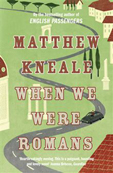 |
.... |
Quotes
from WHEN WE WERE ROMANS |
UK Reviews
‘This
narrative is heartbreakingly moving… Full of
restraint and artistic integrity, this is a poignant,
haunting and
lovely novel.’
............The Guardian
‘(Lawrence)
is the literary first cousin of Roddy Doyle’s
Paddy Clarke…. The heartbreak and triumph of
WHEN WE WERE ROMANS is that little he is the real
thing.’
............Gill
Hornby, Literary Review
‘Matthew
Kneale's lovely novel… is narrated by Lawrence
with insight, humour and sweetly erratic spelling:
it halts and splutters in rhythm with the children's
whims and tantrums… the author has got inside
a young, over-burdened mind with convincing accuracy.’
............Natalie
Whittle, Financial Times
‘Kneale creates an extraordinary tension...
the combination of insight and innocence Kneale gives
Lawrence is powerfully affecting.’
............David
Horspool, Sunday Times
‘A
skilful, humorous and touching novel about the way
a child interprets the world.’
............Daily
Mail
‘The strength of Kneale's novel is not suspense
but Lawrence's delicate sensibility… Lawrence's
touchingly ingenuous language, his tetchy irritation
with his baby sister and his beleaguered optimism
make him a genuinely affecting protagonist.’
............James
Urquart, Independent
‘With
consummate subtlety and sympathy, Kneale finds metaphorical
hinges between the family’s unfolding story
and Lawrence’s two intellectual interests –
Roman emperors and astronomy.’
............Neel
Mukherjee, The Times
‘A
consistently absorbing read, the work of a craftsman.‘
............David
Robson, Sunday Telegraph
‘Laurence’s skilful manoeuvring in a tricksy
adult world is artfully depicted. His guileless voice
only exacerbates the sense of dread, while its deceptive
simplicity hides a chilling exploration of mental
illness and maternal neglect.’
............Elinor
Cook, New Statesman
‘The
compelling and disturbing portrayal of a child's attempt
to make sense of his mother's mental illness.’
............Lianne
Kolirin, Daily Express
The
latest quirky hit from the polyphonic author of English
Passengers… A heartfelt story of mental illness
and tales from space, When We Were Romans wears its
research lightly but punches well above its weight.
............Katy
Guest, Independent on Sunday
What
makes it so affecting is the precision and care with
which Matthew Kneale measures out its dramatic ironies,
and above all the authenticity of Lawrence's voice.
............Laurence
Phelan, Independent
US Reviews
This
is the novel that Patrick McCabe’s over-praised
The Butcher Boy ought to have been, redeemed by Kneale’s
sure-handed restraint…. One of the best explorations
of a child’s mind and heart in recent fiction,
and its talented author’s best book yet.
............Kirkus
Reviews (starred)
Kneale
has created a marvellously engaging and believable
voice for Lawrence, whose account is at once heartbreaking
and humorous (often unintentionally so, complete with
nine-year-old misspellings)… A story that is,
at once, idiosyncratic, original, and altogether memorable.
............Michael
Cart, Booklist Review
There
have been plenty of coming-of-age stories that pit
a child’s innocence against the inexorable force
of parents’ insanity, but perhaps none that
has captures the tension, confusion and ultimate loss
of that innocence any better than When We Were Romans.
............Robert
Weibezahl, Bookpage
As
Lawrence immerses himself in Roman history from a
series of "Horrible Histories," he renders
the story of his mother's breakdown with touching
sensitivity and vulnerability. Very highly recommended.
............Barbara
Love, Library Journal
The
quality that sets Kneale apart is his talent for impersonation.
He told the story of English Passengers using no fewer
than 20 idiosyncratic voices, including those of a
rum smuggler, a delusional missionary, a racist doctor,
a penal colony inmate and several of Tasmania's last
remaining aborigines. The narrative seemed not so
much written as clamorously populated… His latest
novel features only a single voice yet is an equally
impressive act of ventriloquism.
............Washington
Post
‘The
journey through Lawrence's complex mind is touching
and delightful, mostly because he is such an unswervingly
authentic little boy.’
............Mary
Brennan, Seattle Times
____________________________________________________________________________
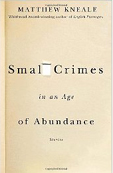 |
.... |
Small
Crimes in an Age of Abundance Quotes |
UK Quotes
‘In
chillingly understated prose, Kneale shows people
in unthinking possession of first-world privileges
failing to acknowledge the effects of their actions
in the third… Kneale does not judge. Like a
film director in a silent sequence, he reveals. He
is witty, compassionate; he understands all sides.’
............Ruth
Padell, Independent
‘These
fine, subtle short stories travel the world –
and the social scale…. A welcome reminder of
a fine, subtle talent.’
............David
Robson, Sunday Telegraph
‘Office’
excruciating, with jet-black shades of Evelyn Waugh
at his cruellest’
............John
O’Connell, Time Out
‘Darkly
funny and sometimes downright macarbre.’
............Economist
‘Kneale’s
moral world is complex and nuanced.’
............Peter
Stanford, Independent on Sunday
‘Neat,
masterful satire, both sophisticated and of enjoyably
immense geographical range.’
............David
Robinson, the Scotsman
‘A
series of compelling narrative jaunts which have a
kind of licensed freedom of thought.’
............Vanessa
Thorpe, Observer
‘Every
one of these “crimes” is a page-turner.’
............Rose
Millard, New Statesman
‘Filled
with shaming truths and silent accusations, they make
for compulsive reading. Simple and straighforward,
each is better than the last. Exploring our own weaknesses
has never been such a pleasure.’
............Francesca
Segal, Telegraph
US
Reviews
A
most unusual debut collection, and a very good one
indeed.
............Kirkus
reviews
‘Kneale
has captured in 12 stories, simply told, the complexity
of the world and the ways that people cope, or not,
showcasing situations of moral ambiguity where roads
not taken make all the difference.’
............Valerie
Ryan, Seattle Times
‘THESE
12 pitch-perfect stories take the reader around the
world, alighting on different forms of devastation
from China to South America to the Middle East. Kneale
doesn't so much reinvent short fiction as reinforce
the form's ability to move and transform with a satisfying
snap.’
............William
Georgiades, New York Post
____________________________________________________________________________
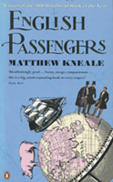 |
.... |
Reviews
of ‘English Passengers’ |
UK
Reviews
'A
book shouting with life ... a novel that would be
intriguing just for its ambition, but is deeply impressive
in the fine grain of its achievement. Every page fizzes
with linguistic invention, and the interleaving of
high comedy with dramatic terror is expertly handled
... English Passengers deserves to be welcomed into
port with a riot of bunting and prizes'
............Steven Poole,
The Guardian
'Triumphant
... Although it contains much that is harrowing, English
Passengers is also often hilarious. Tart wit generates
caustically funny scenes. Relishably ironic fates
are dealt out to the book's more dislikeable characters
... From Patrick White and Thomas Kenneally to David
Malouf and Peter Carey, colonial Australia has been
fortunate in the quality of its literary chroniclers
... English Passengers takes Kneale into this distinguished
company'
............Peter Kemp,
The Sunday Times
‘For
those who know little about (Tasmania’s) past
it would be difficult to find a more vivid history
... The voice Matthew Kneale has found for Peevay,
the aboriginal, with its very believable idiom of
biblical metaphor and convict slang, is perfect ...
English Passengers is one of the most satisfying historical
novels I have read.’
............Derrek
Hines, Times Literary Supplement
'This
is an extraordinary novel ... Vivid descriptions of
places, weather, settlements and the sea voyage are
interspersed with heart-stopping drama ... The book
stays in the mind, haunting one's dreams like a novel
by Dickens. Indeed, it is imbued with some of Dickens's
rage on behalf of the downtrodden. It has moral purpose
and the power to change. A very fine novel indeed'
............Susan
Hill, Mail On Sunday
'An
engrossing, deftly constructed, serious but very readable
book ... a very impressive performance: angry and
ironic by turns, and confident enough to let the story
speak for itself'
............Christopher
Tayler, Sunday Telegraph
'One
of the most enjoyable and interesting reads I have
had in a long time... One of the most shameful events
in the history of the British empire ... is fearlessly
explored with clear-sighted intelligence and unflinching
imagination ... English Passengers is a fascinating
story, richly told: a major work by a major talent'
............Charlotte
Cory, Independent
'Kneale
covers a lot of ground, but the meticulously researched
historical details and background are artfully deployed
and always keep the novel afloat rather than threatening
to sink it. What is really striking about this novel,
however, is its structure and technique ... A jolly
good yarn, a careful and vivid historical re-enactment
and, above all, a tour de force of technical control
and stamina'
............John
de Falbe, Spectator
'[A]
breathtakingly good novel ... funny, savage, compassionate,
a brilliant enactment of ideological clashes and the
opportunism and sacrifice of the colonial adventure,
this is a big, mind-expanding book in every respect.'
............Elizabeth
Buchan, Daily Mai
'An
engrossing and enjoyable read, the sort of novel that
few contemporary writers have either the imagination
or the stamina to sustain'
............John
Preston, Daily Telegraph
'A
dashing historical novel, grand in conception but
carefully and steadily executed ... one of the most
impressive things about English Passengers is the
extent to which it revives our interest in history
and truth ... The voices and information that crowd
English Passengers have been marshalled to support
a compelling adventure story with subversive undertones
... expertly told'
............Ruth
Scurr, The Times
‘An
ingenious and unusual work that sparkles with comic
life ... An unusual historical novel, with elements
of Treasure Island-style adventure, brilliant comic
flourishes and profoundly moving insights into notions
of cultural superiority, English Passengers deserves
a wide audience.’
............Christopher
Silvester
‘Matthew
Kneale’s new novel is a fine piece of historical
fiction ... For all its grimness - and the decline
of the Tasmanian aborigines is movingly rendered -
this is a pleasantly witty book’
............Robert
Potts, Observer
‘In
the strenuousness of its research, in its potent blend
of comedy, satire and tragedy, and in the ardour,
effervescence and the exactness of its writing, it
remains an outstanding achievement.’
............Francis
King, Literary Review
‘Matthew
Kneale’s ‘English Passengers’ is
big, brave and brilliant ... Rigorously researched
and seven years in the writing, ‘English Passengers’
is edifying but never dull. Inexorable tragedy vies
on each page with Mr Kneale’s sense of humour.
Substantial, compelling and unimpeachably well written,
it is a fine and classically satisfying novel.’
............The Economist
'Fantastic.
One of the best books I've read since we started doing
this programme. It's an absolute cracker. Run out
everybody and get copies'
............Susan
Jeffries, Saturday Review
‘This
intelligent and entertaining novel sweeps from Victorian
England across the world to an Australia ... The journey
is made in a ship loaded with characters Stevenson
might have envied ... Matthew Kneale has conjured
a tale of adventure and humour which is also deadly
serious about the effects of racism and colonial exploitation’
............James
Robertson, Scotland on Sunday
‘The
story is, by turns, funny, cynical and moving. At
times it descends into farce, though always with a
sinister undercurrent. As if this were not enough,
the writer also manages to fire indignation at the
appalling way Tasmanians were treated by the self-satisfied Victorians.’
............Leslie Geddes-Brown,
Country Life
‘Hold-outs
who insist on regarding fiction as pleasure should
be advised that Matthew Kneale’s ‘English
Passengers’, however ambitious, also provides
plentiful entertainment. Seven years in the writing,
this exhaustingly researched novel is never exhausting
... While abundantly edifying about a vicious chapter
of British history, Mr Kneale still manages to duplicate
the experience common to avid readers in childhood
and lamentably rare for adults: the subjugation of
dinner and sleep to the voracious consumption of another
fifty pages.’
............Lionel
Shriver, Wall Street Journal Europe, ‘My vote
for the Booker’
‘This
book should become a classic of its time.’
............Cities
to Cities magazine
US
Reviews
‘Kneale’s
careful research and colourful storytelling result
in an impressive epic.’
............Publishers
Weekly (starred)
‘A
richly satisfying debut ... an original, impressively
knowleadgable and very moving historical novel.’
............Kirkus
Reviews (starred)
‘Some
novels are to be savored while curled up in front
of a roaring fire. Matthew Kneale’s robust and
rollocking historical novel ‘English Passengers’
is one of them ... It’s tough to pull off a
memorable epic, but Kneale has done it. So get comfortable
- and be prepared to enter a fascinating world.’
............Bill
Hoffman, New York Post
‘With
its scathing exposure of British colonialism and its
populous and heavily caricatured cast, Kneale’s
adventure tale takes on a Dickensian seriousness ...
Kneale’s detailed exposition of the consequences
of Christian zeal and 19th century eugenics brings
complexity to this novel, making the tale as horrifying
as it is funny.’
............Paula
Friedman, LA Times
‘Everyone
gets his and her just desserts in ways that preserve
the work as art; as in real life, redeeming values
emerge, murkily, out of a malestrom of self-inflicted
insanity. In the end Tasmanaia can be seen as a down
under kind of Australian Eden, and the novel expresses
in picaresque form the birth of a nation. And for
all its outrageous volatility, the whole bloody mess
rings true.’
............Neal
Matthews, San Diego Tribune
‘There
is much to like about this novel ... The book is so
colourful and sweeping, it is easy to overlook some
of its deeper underpinnings ... This is the mark of
a skilled writer who knows his stuff. Tell us more.’
............John
Foster, Bookpage
‘This
is an old-fashioned book in the best sense, epic in
scale, crammed with outsize characters ... Both popular
entertainment and serious fiction.’ A -
............Vanessa
V. Friedman, Entertainment Weekly
‘In
his American debut, Kneale employs a delicious sly
and clever wit to tell his story about the colonization
of both the land and the mind ... A delight to read.
As Peevay would put it, this is a book for “Cherishings”’.
............Neal
Wyatt, Booklist
‘SOMETIMES
a book comes along so full of wit and charm that it
makes you glad you learned to read. Matthew Kneale's
historical novel English Passengers is that kind of
book... Kneale's great success lies in his ability
to weave the characters in and out of this robust
tale, keeping their many voices distinct and authentic
... Pure pleasure, this book.’
............Barbara
Liss, Houston Chronicle
‘What
you have here is a rip-roaring tale ingeniously told
in language that frequently rises to the level of
poetry. Moreover, Kneale achieves a powerful moral
resonance without ever once climbing onto a soapbox.
There isn’t much more you can ask of an author
- or find in a book.’
............Frank
Wilson, Philadelphia Inquirer
‘A
wrily comic, beautifully told seafaring yarn.’
............Newsweek
Canada
Reviews
‘A
robust intellectual entertainment, a comic sea adventure,
survival tale and quest for the Garden of Eden all
bound into one.’
............Andrew
Pyper, Globe & Mail
‘Picked
from its beach and put to the ear, English Passengers
will do more than sound like the sea. It will drown
you, it will sweep you away, laughing, in a torrent
of voices from 150 years ago and still with so much
to say.’
............Darryl
Whetter, National Post
‘An
outstanding historical novel by English author Matthew
Kneale ... A wonderfully contrived and engrossing
book, the brilliance of the narrative techniques highlights
the tragic ironies to give a comprehensive examination
of this shameful drama.’
............Chris
Gordon-Craig, Edmonton Journal
‘This
is a master storyteller at work, and he has written
an astonishingly vivid and moving novel - wholly persuasive,
blisteringly critical and very, very funny.’
............Kevin
Patterson
Australia Reviews
‘Although
Kneale’s writing luxuriates in the purest storytelling
bravado, the important elements of the novel, particularly
the Tasmanian sections, are firmly anchored to historical
accuracy ... The result is a marvellously different
novel, and one that gusts along, like the Sincerity,
with superb verve and confidence, until everything
explodes in a magnificent conclusion in which the
fates are sealed, wrongs righted and ironies deliciously
delivered.’
............Janet Chimonyo,
The Weekend Australian
‘Matthew
Kneale’s ENGLISH PASSENGERS is a fine foray
into the history of Tasmania ... Kneale’s greatest
success lies in demonstrating that there is nothing
like the artifice of fiction to bring the truth from
the past. By mixing historical fact with farcical
comedy, he successively makes even those well-known
episodes from Tasmania’s past appear unreal,
and he ignites in the reader a genuine desire to find
out whether other moments are fictional or not.’
............Catherine
Keenan, Sydney Morning Herald
‘Some
books can be galloped through, hurdling over slow
prose to catch the story in the easy meadows of dialogue.
Others need to be grazed at leisure, preferably beside
a slow fire with a superior malt to complete the contentment.
Such a book is Matthew Kneale’s epic English
Passengers ... The story of the humiliations and cruelties
heaped upon the native people by colonists high Christian
self-righteousness and scientific hubris has rarely
been told so touchingly and with such savage effect
as in Kneale’s engrossing novel. It is a beautifully
written book to be read slowly and savoured for its
rich scholarship, inventive construction and splendid
prose.’
............Frank
O’Shea, Canberra Times
‘Kneale’s
use of this polyglottic form possesses utopian force,
endowing our early colonial period with a full ecology
of voices ... The ship narrative is delightfully picaresque
and often savagely funny ... Kneale throws out a challenge
to other novelists and readers to find inclusive ways
of writing and speaking, new forms for our historical
imagination.’
............Delia
Falconer, The Age, 17th June 2000
‘It
looks as if England’s Matthew Kneale has produced
this year’s most impressive Australian historical
novel. His English Passengers is an immensely readable,
unsettling view of the slaughter of Tasmania’s
Aborigines. This bleak subject might be well-explored
territory in our own fiction, but Kneale makes it
new with 20 narrrative voices and a Shakespearean
flair for comic invention.
............Sally
Blakeney, The Book Bulletin
____________________________________________________________________________
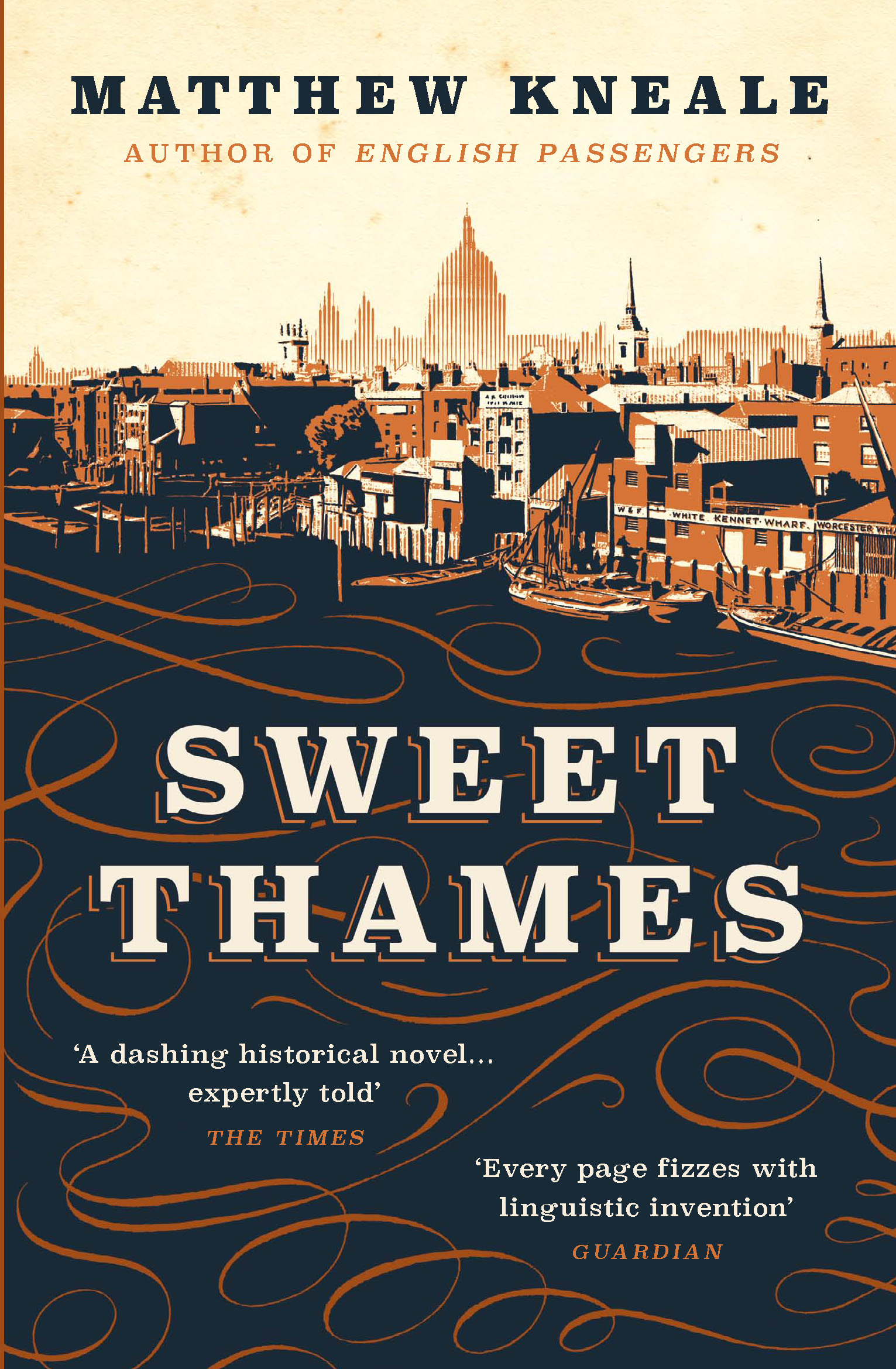 |
.... |
Sweet
Thames Reviews |
‘In this excellent novel Matthew Kneale takes
the fashionable course of setting his story in a previous
century, in this case the London of 1849, while at
the same time taking the less fashionable course of
having a clearly defined purpose and a well-constructed,
continually appealing plot. It is a pleasure to read
a novel which has a reason for being written beyond
either showing off a facility with the rhythms of
non-20th-century speech or conducting experiments
with structure…. The gradual unfolding of the
plot is superbly done, as is the slow unravelling
and remaking of Joshua Jeavons, who is woken from
the ‘toxic slumber of unanimity’ and forced
to think, for the first time in his life, independently.’
............Mark
Illis, Spectator, 8th August 1992
‘Fascination
with the squalor of the past makes Matthew Kneale’s
novel Sweet Thames irrestistable.’
............Jennifer
Selway, Observer
‘Here,
indeed, is music to English ears.’
............Christopher
Hawtree, Evening Standard
‘The
re-creating of 1849 London in all its pungent vitality
and mortality is Kneale’s forte... Muck - 19th
and 20th century - has prove3d a remarkable fertiliser
to Kneale’s robust imagination.’
............Peter
Kemp, Sunday Times
‘A
fascinating novel which succeeds in being a fast-moving
suspense story as well as an absorbing account of
the problems of sewage disposal in nineteenth-century
London. I’m normally deeply resistant to historical
fiction, but this won me over within the first few
pages.’
............Penelope
Lively
‘Kneale
brings vividly to life the corruption and hardship
of Victorian London in a vintage mystery story full
of fascinating detail and human comedy.’
............Times
____________________________________________________________________________
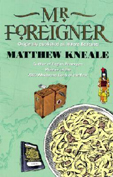 |
.... |
Whore
Banquets / Mr Foreigner Reviews |
‘Part thriller and part black comedy, the book
moves at a cracking pace.’
............Anne Bilson,
Time out, 14th January 1987
‘Whore
Banquets is Matthew Kneale’s first novel. It has
a light, unpretentious touch, and its dialogue convincingly
mimics a varied range of English and would-be English
registers ... The novel is highly readable and marks
a confident start.’
............Richard
Deveson, Times Literary Supplement, 30th Jan 1987
‘It’s
exciting to read a first novel and realise that we have
a promising new writer. Whore Banquets is a short, sinister
and horribly funny book about a footloose young Englishman,
Daniel, who gets into trouble in Tokyo.’
............Victoria
Glendinning, Cosmopolitan, 5th Jan 1987
‘One
is left eager for its successor.’
............Daily Telegraph,
6th February 1987
‘A
first novel full of dry humour and menace.’
............Observer,
1st February 1987
‘This
is a fine book, its comedy nicely underplayed, making
the world seem big and frightening after reading it,
and the business of crossing frontiers only for the
brave.’
............Sunday
Telegraph, 22nd February 1987
‘Enticing
as the title of Matthew Kneale’s first novel may
be, the characterisation, language, humour and irony
produce an overall effect that is deeply disturbing
as well as comic…’
............Emily Robinson,
Literary Review
____________________________________________________________________________